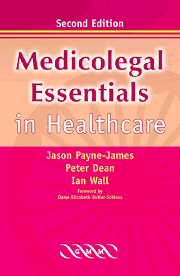Book contents
- Frontmatter
- Contents
- Contributors
- Editors' note for the first edition
- Editors' note for the second edition
- Foreword
- Table of statutes
- Table of cases
- 1 Legal institutions and the legal process
- 2 Human rights and healthcare professionals
- 3 Medical ethics and the forensic physician
- 4 Confidentiality
- 5 Consent to medical treatment
- 6 Professional bodies and discipline
- 7 Complaints in the National Health Service
- 8 The Mental Health Act (England and Wales)
- 9 Death certification and the role of the coroner
- 10 Tissues and organs
- 11 Organ donation
- 12 Living wills
- 13 Euthanasia and end-of-life decision-making
- 14 Abortion and reproductive health
- 15 The Children Act 1989
- 16 Clinical negligence
- 17 Legislation for medicines and product liability
- 18 Clinical trials: ethical, legal and practical considerations
- 19 Medicolegal implications of blood-borne viruses
- 20 Healthcare professionals in court – professional and expert witnesses
- Index
2 - Human rights and healthcare professionals
Published online by Cambridge University Press: 12 January 2010
- Frontmatter
- Contents
- Contributors
- Editors' note for the first edition
- Editors' note for the second edition
- Foreword
- Table of statutes
- Table of cases
- 1 Legal institutions and the legal process
- 2 Human rights and healthcare professionals
- 3 Medical ethics and the forensic physician
- 4 Confidentiality
- 5 Consent to medical treatment
- 6 Professional bodies and discipline
- 7 Complaints in the National Health Service
- 8 The Mental Health Act (England and Wales)
- 9 Death certification and the role of the coroner
- 10 Tissues and organs
- 11 Organ donation
- 12 Living wills
- 13 Euthanasia and end-of-life decision-making
- 14 Abortion and reproductive health
- 15 The Children Act 1989
- 16 Clinical negligence
- 17 Legislation for medicines and product liability
- 18 Clinical trials: ethical, legal and practical considerations
- 19 Medicolegal implications of blood-borne viruses
- 20 Healthcare professionals in court – professional and expert witnesses
- Index
Summary
HUMAN RIGHTS
The concept of human rights is that people have inherent rights simply because they are human. The ideas that developed during the Renaissance were that all men (but not generally at that stage, women or children) were equal. This was either for religious reasons, such as the Protestant view that as all men were created in God's image they must be equal, or because it was a fundamental principle in their secular humanist philosophy. They should therefore, be treated equally by the law. They, or according to many political philosophers, those with some degree of social standing, have the right to try to influence political decisions that affect them. Their personal lives and possessions should not be interfered with arbitrarily. These formulations are equivalent to the biomedical ethics, principles of justice, autonomy and non-maleficence respectively (see also Chapter 3).
It is possible to find references to some of the concepts that later became those of human rights in such documents as the Code of Hammurabi (1780 BCE) and Aristotle's Nichomachean Ethics (330 BCE). One of the first legal instruments in the UK covering human rights issues was the Magna Carta (1215), in articles such as:
(39). No freeman shall be seized, or imprisoned, or dispossessed, or outlawed, or in any way destroyed; nor will we condemn him, nor will we commit him to prison, excepting by the legal judgement of his peers, or by the laws of the land.
- Type
- Chapter
- Information
- Medicolegal Essentials in Healthcare , pp. 11 - 20Publisher: Cambridge University PressPrint publication year: 2004



